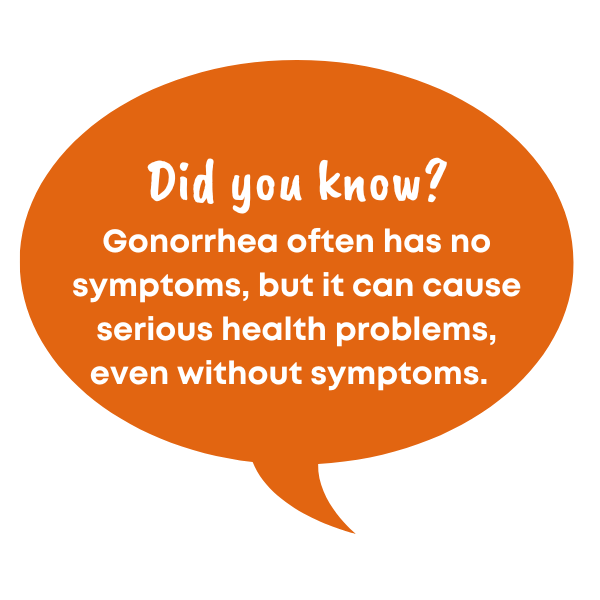Gonorrhea Facts
People who are sexually active can get gonorrhea, a common, treatable, sexually transmitted infection (STI). This page provides Gonorrhea facts to keep you informed.
Gonorrhea (also known as “the clap”) is an infection caused by the bacteria Neisseria gonorrhoeae.
Gonorrhea is an STI that can cause infection in the genitals, rectum, and throat. It is very common, especially among young people ages 15-24 years.
If it is undiagnosed and untreated, Gonorrhea can cause serious health complications.
If you are pregnant and have Gonorrhea, you can give the infection to your baby during delivery. Treating Gonorrhea as soon as possible will make health problems for your baby less likely.

What are the symptoms
Gonorrhea often has no symptoms, but it can cause serious health problems, even without symptoms.
Most people with a cervix with Gonorrhea do not have any symptoms. Even when symptoms exist, they are often mild and can be mistaken for a bladder or vaginal infection. Symptoms in people with a cervix can include:
Painful or burning sensation when peeing;
Increased vaginal discharge; and
Vaginal bleeding between periods.
Men who do have symptoms may have:
A burning sensation when peeing;
A white, yellow, or green discharge from the penis; and
Painful or swollen testicles (although this is less common).
Rectal infections may either cause no symptoms or cause symptoms that may include:
Discharge;
Anal itching;
Soreness;
Bleeding; and
Painful bowel movements.
How can I protect myself
If you are sexually active, the following things can lower your chances of getting Gonorrhea:
Get tested prior to engaging in a sexual relationship.
Using condoms the right way every time you have sex.
Consider a mutual monogamous relationship with a partner who has been tested and does not have Gonorrhea.
Tell me more about testing and treatment
Most of the time, a healthcare provider will use a a urine sample to diagnose Gonorrhea. However, if you have had oral and/or anal sex, your healthcare provider may use swabs to collect samples from your throat and/or rectum. In some cases, a healthcare provider may also use a swab to collect a sample from a urethra (urine canal) or cervix.
The right treatment can cure Gonorrhea. It is important that you take all of the medicine your healthcare provider gives you to cure your infection. Do not share medicine for Gonorrhea with anyone. Although medicine will stop the infection, it will not undo any permanent damage caused by the infection.
It is becoming harder to treat some Gonorrhea, as drug-resistant strains of Gonorrhea are increasing. Return to a healthcare provider if your symptoms continue for more than a few days after receiving treatment.

Learn more STI facts and news on the CDC website.
